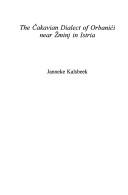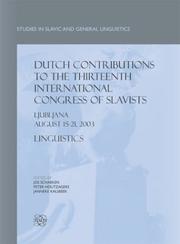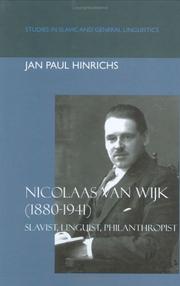| Listing 1 - 10 of 12 | << page >> |
Sort by
|
Dissertation
Year: 1998 Publisher: Amsterdam Rodopi
Abstract | Keywords | Export | Availability | Bookmark
 Loading...
Loading...Choose an application
- Reference Manager
- EndNote
- RefWorks (Direct export to RefWorks)
Book
Year: 1998 Publisher: Leiden Rijksuniversiteit
Abstract | Keywords | Export | Availability | Bookmark
 Loading...
Loading...Choose an application
- Reference Manager
- EndNote
- RefWorks (Direct export to RefWorks)
Book
ISBN: 9004658858 Year: 1998 Publisher: Amsterdam : BRILL,
Abstract | Keywords | Export | Availability | Bookmark
 Loading...
Loading...Choose an application
- Reference Manager
- EndNote
- RefWorks (Direct export to RefWorks)
Cakavian dialects, the westernmost dialects of the South Slavic language area, have long attracted the attention of investigators, largely owing to the complexity of their prosodic systems. These prosodic systems are interesting not only from a typological point of view, but also contain material of great importance for the study of Slavic historical accentology. The description of a Cakavian dialect in Istria (Croatia) presented in this volume contributes data for South Slavic historical dialectology, and for historical accentology. The book includes an introduction on Cakavian and other South Slavic dialects, particularly those spoken in Istria, and chapters, based on fieldwork by the author, on the phonology, morphology and some syntactic phenomena of the dialect of Orbanici. In the chapters on morphology, special attention is paid to accentuation types. The book also contains dialect texts (70 pp.) and a lexicon, in which all attested forms are listed.

ISBN: 9042007125 Year: 1998 Publisher: Amsterdam : Rodopi,
Abstract | Keywords | Export | Availability | Bookmark
 Loading...
Loading...Choose an application
- Reference Manager
- EndNote
- RefWorks (Direct export to RefWorks)
Čakavian dialect. --- Serbo-Croatian language --- Serbo-Croatian language --- Dialects --- Dialects
Book
ISBN: 940120618X 1435665732 9042024429 9789042024427 9781435665736 9789401206181 Year: 2008 Publisher: Amsterdam New York, NY Rodopi
Abstract | Keywords | Export | Availability | Bookmark
 Loading...
Loading...Choose an application
- Reference Manager
- EndNote
- RefWorks (Direct export to RefWorks)
This volume contains articles by 17 slavists from the Low Countries. Although they are all about Slavic linguistics, they cover a wide range of subjects and their theoretical implications are often not restricted to slavistics alone. Most contributions deal with Russian or Slavic in general, but South and West Slavic are also represented. The reader who knows the strong points for which Dutch slavistics is traditionally known and appreciated will not be disappointed: s/he will find papers on syntax and semantics (Fortuin, Van Helden, Honselaar, Keijsper, Tribušinina), aspectology (Barentsen, Genis), philology (Veder), historical Slavic phonology and morphology (Derksen, Kortlandt, Vermeer), dialectology (Houtzagers, Pronk), the study of sentence intonation (Odé) and papers representing crossroads between these disciplines: philology and historical linguistics (Hendriks, Schaeken), aspectology and philology (Kalsbeek). Apart from its quality in the linguistic fields enumerated here, Dutch Slavic linguistics is known for its empirical approach: the main goal is to find explanations for linguistic reality. Theory is relevant inasmuch as it helps us to find such explanations and not for its own sake. Though each and every paper in this volume exemplifies this empirical attitude, it might be especially illustrative to mention that almost all authors who studied the larger contemporary Slavic languages made extensive use of language corpus resources, part of which were collected at the University of Amsterdam.
Slavic languages --- Slavic languages. --- Balto-Slavic languages --- Slavonic languages --- Indo-European languages --- Conferences - Meetings --- Language arts --- Communication arts --- Communication --- Study and teaching

ISBN: 9042008474 Year: 2003 Publisher: Amsterdam : Rodopi,
Abstract | Keywords | Export | Availability | Bookmark
 Loading...
Loading...Choose an application
- Reference Manager
- EndNote
- RefWorks (Direct export to RefWorks)

ISBN: 9789004488366 9789042008472 Year: 2003 Publisher: Leiden; Boston : BRILL
Abstract | Keywords | Export | Availability | Bookmark
 Loading...
Loading...Choose an application
- Reference Manager
- EndNote
- RefWorks (Direct export to RefWorks)
Book
ISBN: 9789061434368 906143436X Year: 2017 Publisher: Amsterdam : Pegasus,
Abstract | Keywords | Export | Availability | Bookmark
 Loading...
Loading...Choose an application
- Reference Manager
- EndNote
- RefWorks (Direct export to RefWorks)

ISBN: 9042020237 9789042020238 940120313X 1423791118 9781423791119 9789401203135 Year: 2006 Publisher: Amsterdam New York, NY Rodopi
Abstract | Keywords | Export | Availability | Bookmark
 Loading...
Loading...Choose an application
- Reference Manager
- EndNote
- RefWorks (Direct export to RefWorks)
Nicolaas van Wijk (1880-1941) was the founder of Slavic studies in the Netherlands and one of the greatest Slavists in general. This book describes for the first time how a scholar of the Dutch language, whose etymological dictionary of the Dutch language is still considered the best of its kind, was appointed in 1913 to the newly created Chair in Slavic languages at Leiden University and built up a tremendous reputation for himself in Eastern Europe. Van Wijk's relations with his famous teacher, the linguist C.C. Uhlenbeck, are followed attentively, as is his postgraduate apprenticeship in Leipzig (1902-1903), where he followed August Leskien's lectures in Slavic studies. Attention is also paid to the various aspects of Van Wijk's enormous oeuvre covering the whole field of Slavic studies and of phonology, of which he was one of the pioneers. Van Wijk did not, however, follow the lines approved for the social conduct of a Leiden professor and was at one time suspected by the police of communist activities. His commitment to materially helping all he could from an Eastern Europe torn apart by the First World War and its aftermath was exceptional. His fascination with all things Russian is a background theme that played throughout his life and even at his death: son of a Dutch Reformed minister, the bachelor Van Wijk was buried in a grave surmounted by a Russian Orthodox cross beside his Russian foster son, who died young. This book is of interest to Slavists, linguists and cultural historians.
van Wijk, Nicolas --- Linguists --- Netherlands --- Biography --- Slavists --- Philanthropists --- Altruists --- Humanitarians --- Benefactors --- Philologists --- Slavicists --- Area specialists --- Wijk, Nicolaas van, --- Van Wijk, Nicolaas, --- Philanthropists.
Book
ISBN: 9401210659 9789401210652 9789042038189 9042038187 1306738512 9781306738514 Year: 2014 Publisher: Amsterdam Editions Rodopi
Abstract | Keywords | Export | Availability | Bookmark
 Loading...
Loading...Choose an application
- Reference Manager
- EndNote
- RefWorks (Direct export to RefWorks)
This volume, Dutch Contributions to the Fifteenth International Congress of Slavists (Minsk, 2013) presents a comprehensive overview of current Slavic linguistic research in the Netherlands, and covers its various linguistic disciplines (both synchronic and diachronic linguistics, language acquisition, history of linguistics) and subdomains (phonology, semantics, syntax, pragmatics, text). The different chapters in this peer-reviewed volume show the strong data-oriented tradition of Dutch linguistics and focus on various topics: the use of imperative subjects in birchbark letters (Dekker), the existential construction in Russian (Fortuin), Jakovlev’s formula for designing an alphabet with an optimal number of graphemes (Van Helden), frequency effects on the acquisition of Polish and Russian nominal flexion paradigms (Janssen), Macedonian verbal aspect (Kamphuis), the concept of ‘communicatively heterogeneous texts’ in connection with three birchbark letters from medieval Rus’ (Schaeken), a philological analysis of the authorship of some Cyrillic manuscripts (Veder), a reconstruction of the evolution of the Slavic system of obstruents: the motivation of mergers and the rise of dialect differences (Vermeer), and a contrastive analysis of Russian delat’ and Dutch doen (Honselaar and Podgaevskaja). With a well-known cast of contributors, this reference work will be of interest to researchers in both Slavic and general linguistics.
Indo-European languages --- Language and languages. --- Slavic languages --- Indo-European languages. --- Slavic languages. --- Foreign languages --- Languages --- Anthropology --- Communication --- Ethnology --- Information theory --- Meaning (Psychology) --- Philology --- Linguistics --- Balto-Slavic languages --- Slavonic languages --- Aryan languages --- Indo-Germanic languages
| Listing 1 - 10 of 12 | << page >> |
Sort by
|

 Search
Search Feedback
Feedback About UniCat
About UniCat  Help
Help News
News